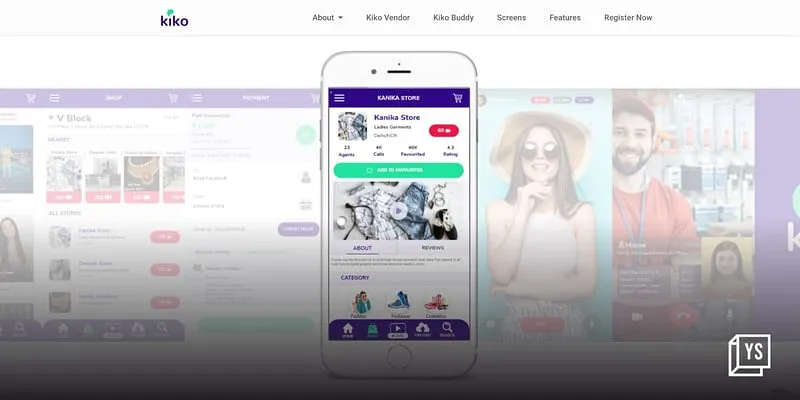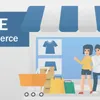Vocal for local ecommerce: This app is helping small businesses become virtual kiranas
Kiko Live is a live shopping and entertainment startup that enables users to shop virtually from small businesses in their neighbourhood.
Rewind the clock to 10 years ago and TV programming back then was very different. Outside of prime time, all channels were dominated by anchors screaming at the top of their lungs and jostling to sell products—from washing machines to diamonds.
“Look at this room cleaner! It is selling out fast, pick up your phone to order now!”
“Only Rs 2,400 for a 32-piece set of crockeries! Call this number on your screen to place the order!”
Before online shopping became a part and parcel of our lives, live TV shopping ruled the retail world. Rather than walking for hours in crowded marketplaces, many people had started to shop from the comfort of their homes by calling on the numbers flashing on the screen.
As ecommerce today becomes mainstream and more interactive, retail companies and brands are taking a leaf out of the days of live shopping.
Alok Chawla, who had previously founded Zipcash (acquired by and renamed Ola Money), wanted to explore the possibilities of live commerce in India and how it can help small businesses. An NMIMS Mumbai alum and a serial entrepreneur, he brainstormed with his friend Shivam Varshney, an IIT Bombay alumnus who has previously worked with the likes of SpeedLabs, HDFC Red, and Blockcube.
“Live commerce is already a big thing in the US and China. In fact, 25 percent of ecommerce in China comes from it. We wanted to make live commerce beneficial for small businesses in India and onboard them to the bigger ecommerce ecosystem,” Alok tells YourStory.
He adds that one of the major drawbacks of catalogue-based shopping is the absence of loyalty among the buyers as they migrate to a competing portal for the smallest of discounts. However, in human-led shopping, there is a loyalty and bond between the buyer and seller and live commerce has the potential to replicate it. Hence, the duo decided to focus specifically on live commerce.
In 2020, Alok and Shivam founded —a live shopping startup that helps users discover shops in their neighbourhood (within a 3 km radius). These shops can be local grocery stores, chemists, meat shops, paan shops, electronics stores, utensils stores, and even street vendors.
Shivam Varshney moved on from Kiko Live in 2022.

Kiko Live
How does it work
Based out of Mumbai, the live commerce platform is building a hyperlocal marketplace of shops that rely heavily on walk-in customers.
The platform has onboarded about 10,000 small shops across the country. It also facilitates the delivery on the behalf of shopkeepers in selected pin codes across Mumbai and Delhi. While the startup facilitates online orders for shops located in other cities and states, the shopkeepers there have to deliver on their own.
In January 2022, Kiko Live launched its freemium mobile app. Since then, it has been downloaded over 530,000 times across Apple App Store and Google Play Store. It targets shopkeepers who can download the app and register themselves for a virtual store in exchange for an undisclosed fixed rate. The platform doesn’t charge any commission on sales.
The basic subscription plan, which costs around Rs 200, covers the rent for the virtual shop and allows shopkeepers to entertain a maximum of 10 calls for enquiries and placing orders. Beyond that threshold, they need to pay additional charges or opt for a bigger subscription plan.
Kiko app does not require sellers to update a catalogue. Its purchase experience entails a virtual visit to the shop. Customers get on a video call through the app with the shopkeeper to enquire about the required products and to place orders. They can also bargain with the shopkeepers on the live call before placing the order.
Like how users can discover sellers on ecommerce websites, Kiko Live enables customers to discover shops on the platform. The 22-member team claims that the deliveries are completed within one hour. While some of the onboarded shops have an average of 10 unique customers, others have more than 100 unique customers.
For deliveries, the startup has collaborated with and , along with a few other logistics providers to integrate with their application programming interface (API) and complete the deliveries in different locations. Kiko Live plans to initiate deliveries in the others with the help of third-party partners. Pilot deliveries have already begun in cities including Bengaluru and Kolkata.
Market and revenues
According to the SME Chamber of India, micro, small and medium enterprises account for almost 45 percent of the country’s production and account for 37.54 percent of the Gross Domestic Product (GDP).
The startup says most stores on the platform have high repeat purchases, especially vegetable vendors, chemists, meat shops, pan shops, snack shops, vendors, electronics stores, utensil shops etc.
Nikhil Bansal, who runs a bakery and confectionery store in Pitampura, Delhi, talks about his collaboration with Kiko Live.
“Earlier, I was delivering goods on my own, but after joining the Kiko Live platform, I can easily deliver goods in a timely manner. Overall, it has been a pleasant and smooth sailing experience,” he says.
In November 2021, Kiko Live raised $1 million in a Pre-Series A funding round led by SOSV. It also saw participation from GSF Accelerator and Venture Catalysts, along with Dinesh Agarwal, CEO of ; and Amarjit Batra, Managing Director of India and ex-CEO of India.
While its revenues for FY22 remain undisclosed, the company says that frequent lockdowns during the pandemic created a challenge for the team. During the lockdowns, many small shops had to shutter down and remained unavailable for business, and even those that were allowed to open for limited hours were unable to service many delivery orders.
However, the startup found an opportunity here and reached out to more shops, promising to bring back the business that they were losing to other quick commerce players.
Kiko Live competes with the likes of , M-Live by , , and .

Live commerce is the new it-thing of ecommerce
Future
Commenting on the market scope for Kiko Live, Saket Dandotia, Co-founder of and , and an early investor in Kiko Live, says,
“Traditional quick commerce needs tremendous investments to establish locations, manpower, inventory, etc. On top of that, extensive marketing and offering discounts to retain customers, who jump between platforms just to save a rupee, can become an expensive affair," he says. "However, Kiko Live rides on the buyer's loyalty, where the pricing and discounting are mutually decided between buyers and sellers. It's a truly scalable solution."
predicts that the gross merchandise value of live commerce through short videos would touch $5 billion in India by 2025, and that social commerce would grab around 5 percent of the Indian ecommerce market.
Tapping into the growth, Kiko Live plans to develop its feature, Kiko Buddy, to make live commerce more immersive and real-time. Similar to any social media influencer, anyone who uses the platform for selling products can become a Kiko Buddy. The concept is based on one-to-many live feeds, where the Kiko Buddy can go live on the platform to talk about the products they are selling. Customers can buy the products in real-time or bookmark for purchasing them later.
In the long term, the startup aspires to be the go-to platform for buying items from nearby stores.
(The story was updated with factual corrections.)
Edited by Kanishk Singh










